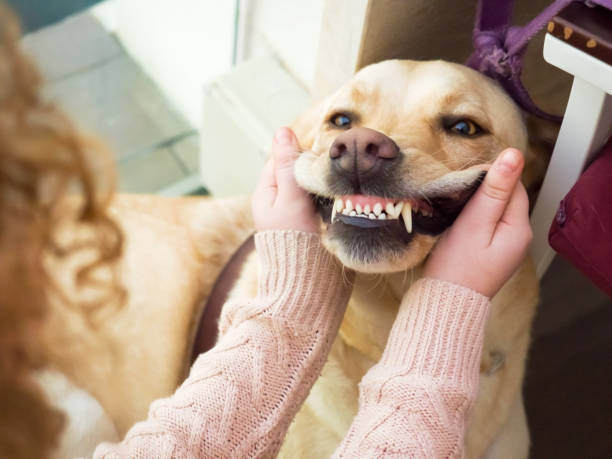Caring for a dog’s dental health is just as important as any other aspect of their well-being.
Neglecting your dog’s teeth can lead to bad breath, gum disease, and even serious infections that affect their overall health. With a proactive approach, you can help your furry companion enjoy a long life free from dental discomfort. This guide covers the basics of dog dental care—from the importance of brushing to vet check-ups—to help you stay on top of your pet's dental needs.
Why Dog Dental Health Matters
 Just like humans, dogs are prone to plaque, tartar buildup, and gum disease. These issues can not only cause discomfort but also lead to more severe health complications, such as infections that spread to the heart, liver, and kidneys. Taking preventive action early is key to keeping your dog’s mouth healthy.
Just like humans, dogs are prone to plaque, tartar buildup, and gum disease. These issues can not only cause discomfort but also lead to more severe health complications, such as infections that spread to the heart, liver, and kidneys. Taking preventive action early is key to keeping your dog’s mouth healthy.
Common dental problems in dogs include:
- Plaque and Tartar: Accumulation on teeth that can harden if not cleaned.
- Periodontal Disease: A serious gum infection that can cause tooth loss.
- Broken or Worn Teeth: Often a result of chewing hard objects.
Poor dental care can cause unnecessary pain and even lead to loss of appetite, which can affect your dog’s overall well-being.
Daily Dental Care: The Basics
The best way to protect your dog’s dental health is through consistent at-home care. While dental treats and toys help, nothing replaces brushing their teeth regularly. Here’s how you can get started:
- Brush Their Teeth: Use dog-friendly toothpaste and a brush designed for dogs. Start by letting them taste the toothpaste, then gradually introduce the brushing motion.
- Dental Chews and Toys: Chews and toys designed for oral health can help reduce plaque and tartar.
- Routine Check-ups: Regular dental check-ups with your vet will ensure that any early signs of dental disease are treated.
Taking care of your dog’s teeth every day can prevent many problems and ensure they remain comfortable and healthy.
When to Seek Professional Help
 Despite your best efforts, professional dental care is sometimes necessary. Knowing when to schedule a vet visit can save your dog from serious dental issues. Keep an eye out for these signs:
Despite your best efforts, professional dental care is sometimes necessary. Knowing when to schedule a vet visit can save your dog from serious dental issues. Keep an eye out for these signs:
- Bad Breath: A persistent odor could signal infection or gum disease.
- Discolored Teeth: Yellowing or browning may indicate plaque buildup.
- Bleeding or Swollen Gums: These can be early signs of periodontal disease.
- Difficulty Chewing or Loss of Appetite: Pain or discomfort in the mouth may make eating uncomfortable for your dog.
Your vet may recommend a professional cleaning to address deep-set plaque and tartar that can’t be removed through brushing alone.
Keeping Your Dog’s Smile Healthy
 By making dental care part of your regular routine, you’ll be doing your dog a huge favor. A few simple habits, like brushing their teeth or offering dental treats, can make a big difference in their oral health. And don’t forget—routine vet visits are essential for catching any potential problems early.
By making dental care part of your regular routine, you’ll be doing your dog a huge favor. A few simple habits, like brushing their teeth or offering dental treats, can make a big difference in their oral health. And don’t forget—routine vet visits are essential for catching any potential problems early.
Give your dog the best chance at a happy, healthy life by prioritizing their dental care. A bright smile means a happy, pain-free companion by your side!
With Gingr, keeping track of pet health is simple. Get a demo today!
Subscribe to the Gingr Blog






